Unit 5 Amazing things Reading 讲义及练习(含答案)牛津译林版七年级英语下册
文档属性
| 名称 | Unit 5 Amazing things Reading 讲义及练习(含答案)牛津译林版七年级英语下册 |
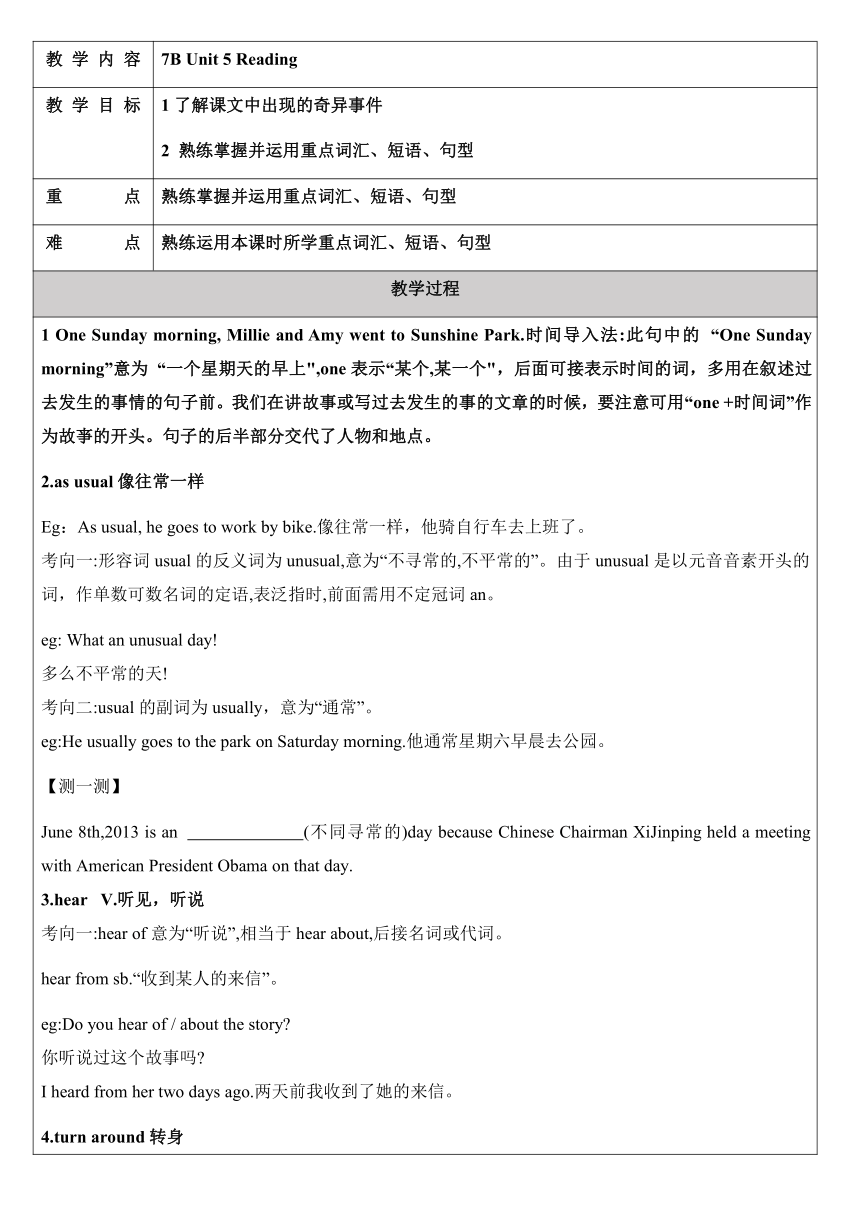
|
|
| 格式 | docx | ||
| 文件大小 | 30.2KB | ||
| 资源类型 | 教案 | ||
| 版本资源 | 牛津译林版 | ||
| 科目 | 英语 | ||
| 更新时间 | 2024-06-18 22:34:59 | ||
图片预览

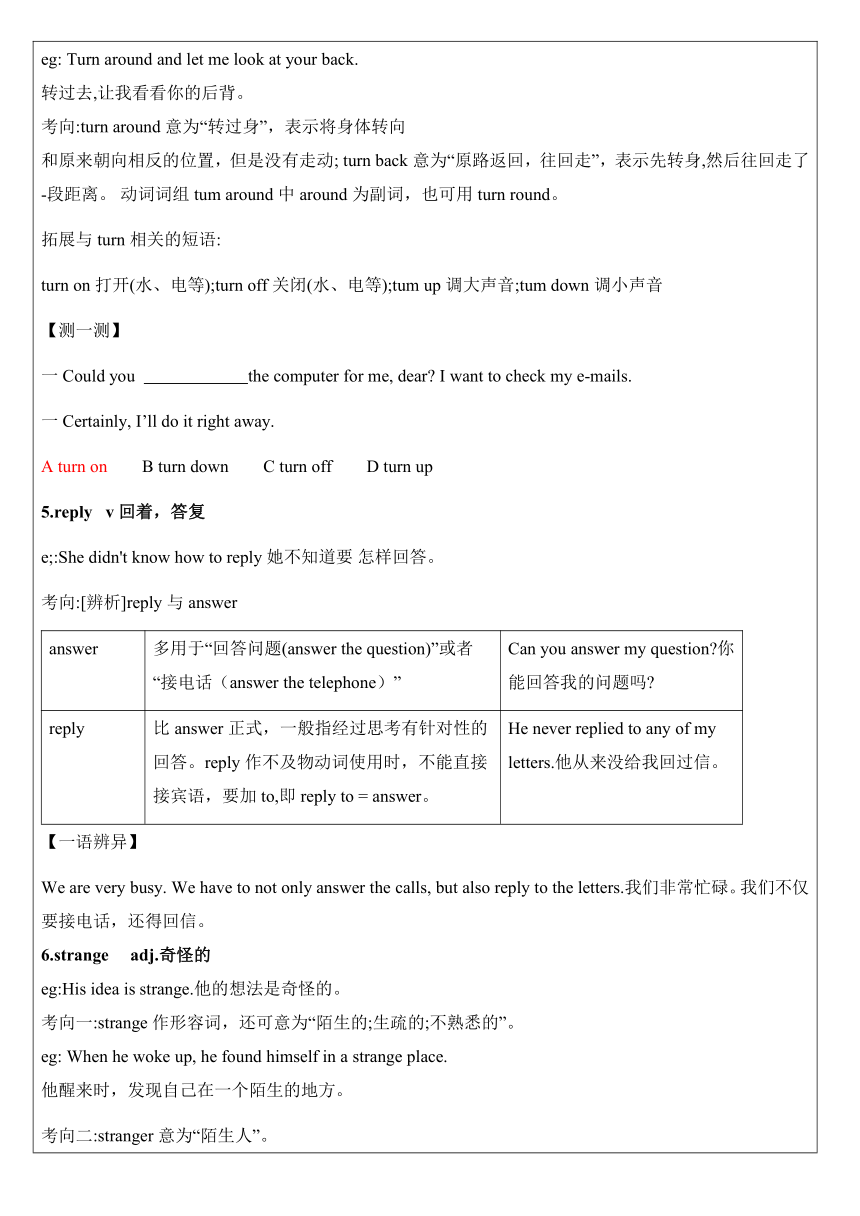
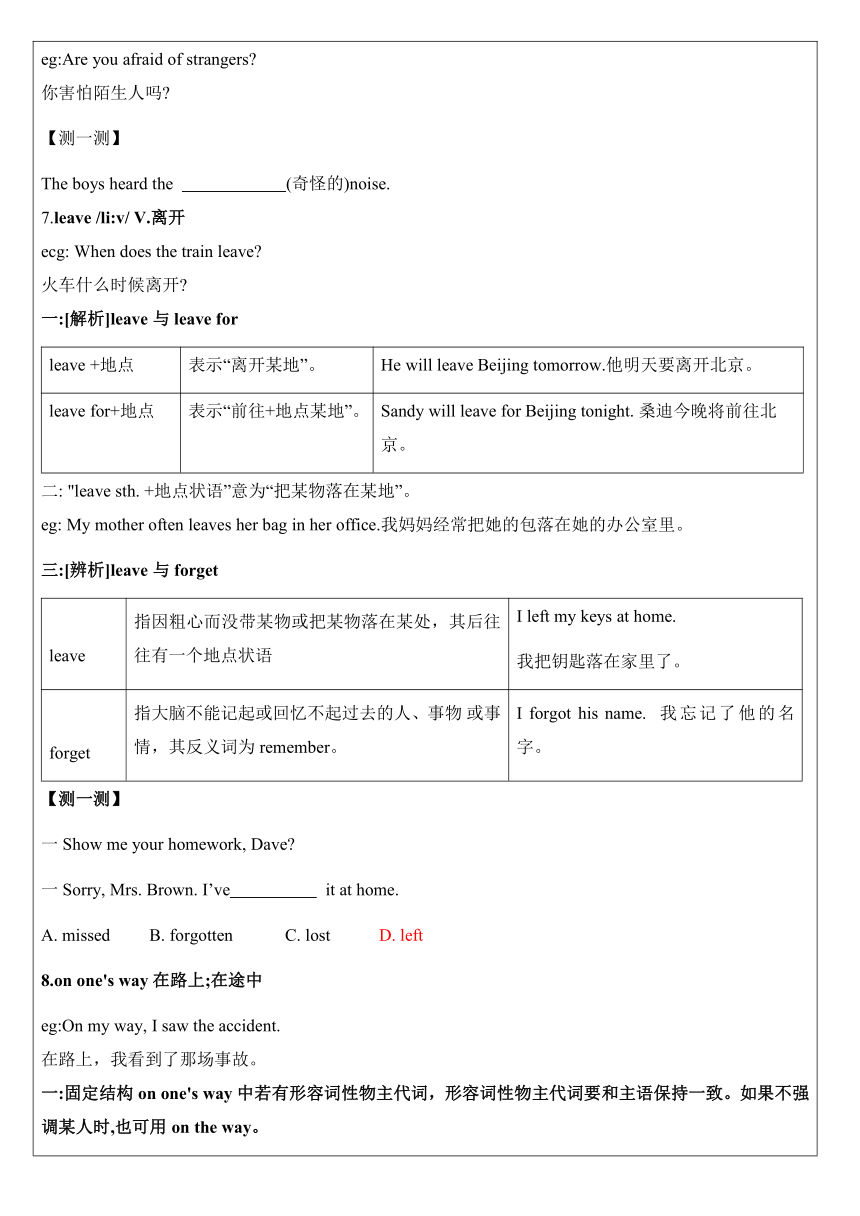
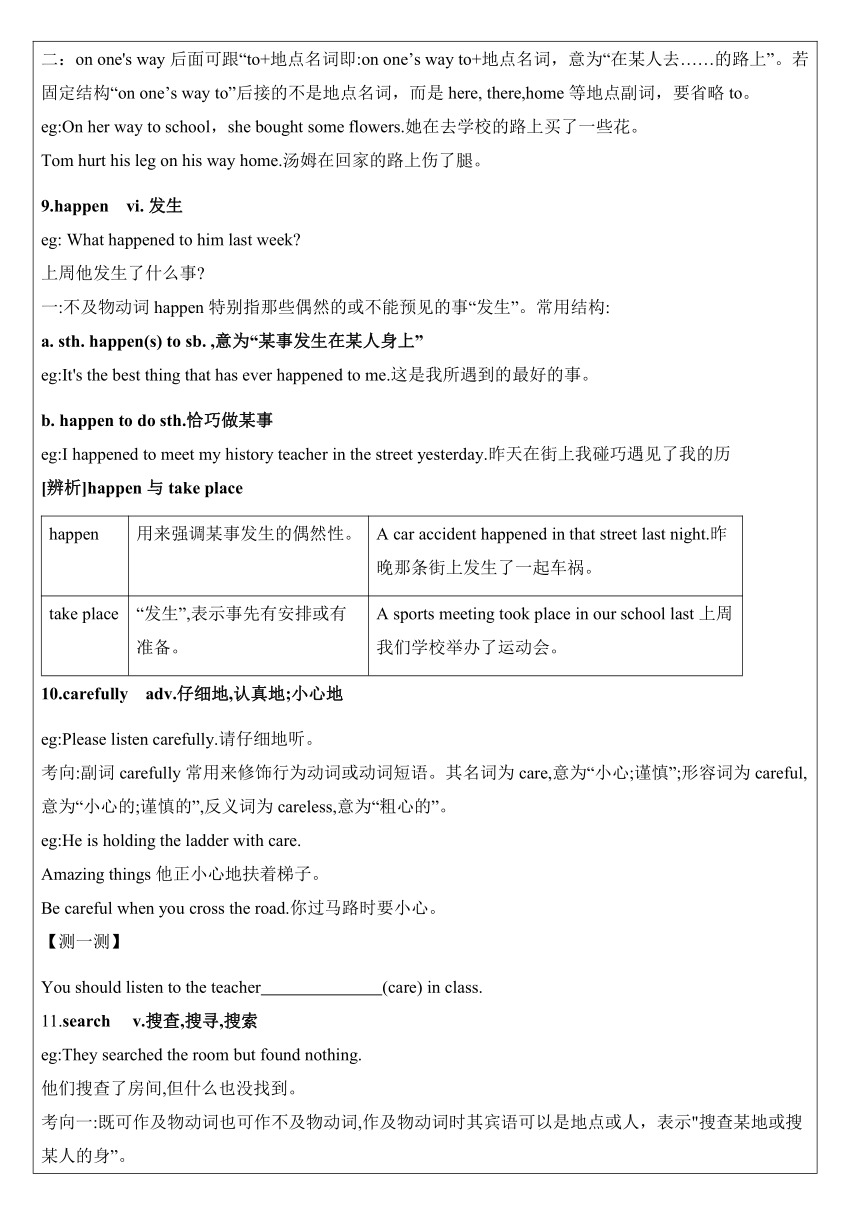
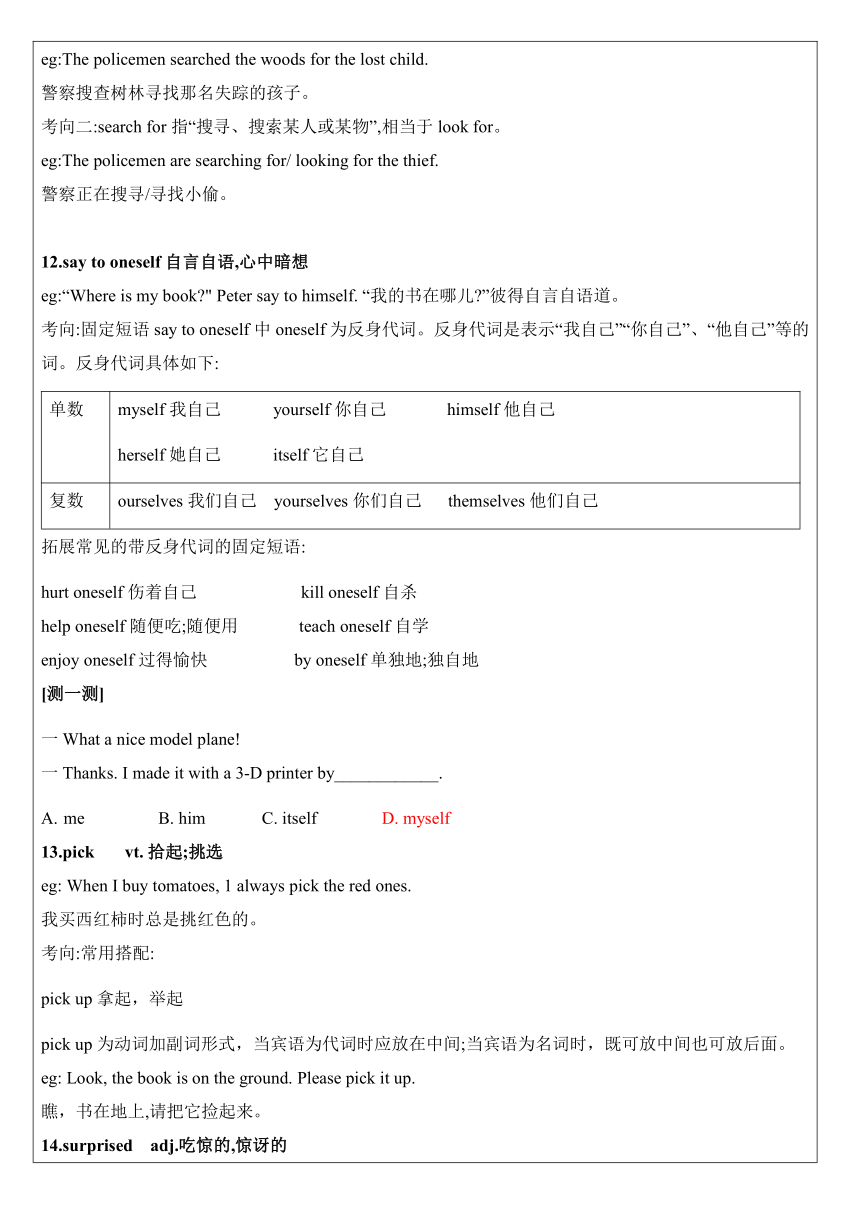
文档简介
教 学 内 容 7B Unit 5 Reading
教 学 目 标 1了解课文中出现的奇异事件 2 熟练掌握并运用重点词汇、短语、句型
重 点 熟练掌握并运用重点词汇、短语、句型
难 点 熟练运用本课时所学重点词汇、短语、句型
教学过程
1 One Sunday morning, Millie and Amy went to Sunshine Park.时间导入法:此句中的 “One Sunday morning”意为 “一个星期天的早上",one表示“某个,某一个",后面可接表示时间的词,多用在叙述过去发生的事情的句子前。我们在讲故事或写过去发生的事的文章的时候,要注意可用“one +时间词”作为故亊的开头。句子的后半部分交代了人物和地点。 2.as usual像往常一样 Eg:As usual, he goes to work by bike.像往常一样,他骑自行车去上班了。
考向一:形容词usual的反义词为unusual,意为“不寻常的,不平常的”。由于unusual是以元音音素开头的词,作单数可数名词的定语,表泛指时,前面需用不定冠词an。 eg: What an unusual day!
多么不平常的天!
考向二:usual的副词为usually,意为“通常”。
eg:He usually goes to the park on Saturday morning.他通常星期六早晨去公园。 【测一测】 June 8th,2013 is an (不同寻常的)day because Chinese Chairman XiJinping held a meeting with American President Obama on that day.
3.hear V.听见,听说
考向一:hear of意为“听说”,相当于hear about,后接名词或代词。 hear from sb.“收到某人的来信”。 eg:Do you hear of / about the story
你听说过这个故事吗
I heard from her two days ago.两天前我收到了她的来信。 4.turn around转身
eg: Turn around and let me look at your back.
转过去,让我看看你的后背。
考向:turn around意为“转过身”,表示将身体转向
和原来朝向相反的位置,但是没有走动; turn back意为“原路返回,往回走”,表示先转身,然后往回走了-段距离。 动词词组tum around中around为副词,也可用turn round。 拓展与turn相关的短语: turn on打开(水、电等);turn off关闭(水、电等);tum up调大声音;tum down调小声音 【测一测】 一Could you the computer for me, dear I want to check my e-mails. 一Certainly, I’ll do it right away. A turn on B turn down C turn off D turn up 5.reply v回着,答复 e;:She didn't know how to reply她不知道要 怎样回答。 考向:[辨析]reply与answer answer多用于“回答问题(answer the question)”或者“接电话(answer the telephone)”Can you answer my question 你能回答我的问题吗 reply比answer正式,一般指经过思考有针对性的回答。reply 作不及物动词使用时,不能直接接宾语,要加to,即 reply to = answer。He never replied to any of my letters.他从来没给我回过信。
【一语辨异】 We are very busy. We have to not only answer the calls, but also reply to the letters.我们非常忙碌。我们不仅要接电话,还得回信。
6.strange adj.奇怪的
eg:His idea is strange.他的想法是奇怪的。
考向一:strange作形容词,还可意为“陌生的;生疏的;不熟悉的”。
eg: When he woke up, he found himself in a strange place.
他醒来时,发现自己在一个陌生的地方。 考向二:stranger意为“陌生人”。
eg:Are you afraid of strangers
你害怕陌生人吗 【测一测】 The boys heard the (奇怪的)noise.
7.leave /li:v/ V.离开
ecg: When does the train leave
火车什么时候离开
一:[解析]leave与leave for leave +地点表示“离开某地”。He will leave Beijing tomorrow.他明天要离开北京。leave for+地点表示“前往+地点某地”。Sandy will leave for Beijing tonight. 桑迪今晚将前往北京。
二: "leave sth. +地点状语”意为“把某物落在某地”。
eg: My mother often leaves her bag in her office.我妈妈经常把她的包落在她的办公室里。 三:[辨析]leave与forget leave指因粗心而没带某物或把某物落在某处,其后往往有一个地点状语I left my keys at home. 我把钥匙落在家里了。 forget指大脑不能记起或回忆不起过去的人、事物 或事情,其反义词为 remember。 I forgot his name. 我忘记了他的名字。
【测一测】 一Show me your homework, Dave 一Sorry, Mrs. Brown. I’ve it at home. A. missed B. forgotten C. lost D. left 8.on one's way在路上;在途中 eg:On my way, I saw the accident.
在路上,我看到了那场事故。
一:固定结构on one's way中若有形容词性物主代词,形容词性物主代词要和主语保持一致。如果不强调某人时,也可用on the way。 二:on one's way后面可跟“to+地点名词即:on one’s way to+地点名词,意为“在某人去……的路上”。若固定结构“on one’s way to”后接的不是地点名词,而是here, there,home等地点副词,要省略to。
eg:On her way to school,she bought some flowers.她在去学校的路上买了一些花。 Tom hurt his leg on his way home.汤姆在回家的路上伤了腿。 9.happen vi. 发生
eg: What happened to him last week
上周他发生了什么事
一:不及物动词happen特别指那些偶然的或不能预见的事“发生”。常用结构:
a. sth. happen(s) to sb. ,意为“某事发生在某人身上”
eg:It's the best thing that has ever happened to me.这是我所遇到的最好的事。 b. happen to do sth.恰巧做某事
eg:I happened to meet my history teacher in the street yesterday.昨天在街上我碰巧遇见了我的历
[辨析]happen与take place happen用来强调某事发生的偶然性。A car accident happened in that street last night.昨晚那条街上发生了一起车祸。take place“发生”,表示事先有安排或有准备。A sports meeting took place in our school last上周我们学校举办了运动会。
10.carefully adv.仔细地,认真地;小心地 eg:Please listen carefully.请仔细地听。
考向:副词carefully常用来修饰行为动词或动词短语。其名词为care,意为“小心;谨慎”;形容词为careful,意为“小心的;谨慎的”,反义词为careless,意为“粗心的”。
eg:He is holding the ladder with care.
Amazing things他正小心地扶着梯子。
Be careful when you cross the road.你过马路时要小心。
【测一测】 You should listen to the teacher (care) in class.
11.search v.搜查,搜寻,搜索
eg:They searched the room but found nothing.
他们搜查了房间,但什么也没找到。
考向一:既可作及物动词也可作不及物动词,作及物动词时其宾语可以是地点或人,表示"搜查某地或搜某人的身”。
eg:The policemen searched the woods for the lost child.
警察搜查树林寻找那名失踪的孩子。
考向二:search for指“搜寻、搜索某人或某物”,相当于look for。
eg:The policemen are searching for/ looking for the thief.
警察正在搜寻/寻找小偷。
12.say to oneself自言自语,心中暗想
eg:“Where is my book " Peter say to himself. “我的书在哪儿 ”彼得自言自语道。
考向:固定短语say to oneself中oneself为反身代词。反身代词是表示“我自己”“你自己”、“他自己”等的词。反身代词具体如下: 单数myself我自己 yourself 你自己 himself他自己 herself 她自己 itself它自己复数ourselves 我们自己 yourselves 你们自己 themselves他们自己
拓展常见的带反身代词的固定短语: hurt oneself伤着自己 kill oneself自杀
help oneself随便吃;随便用 teach oneself自学
enjoy oneself过得愉快 by oneself单独地;独自地
[测一测] 一 What a nice model plane!
一 Thanks. I made it with a 3-D printer by____________. me B. him C. itself D. myself
13.pick vt. 拾起;挑选
eg: When I buy tomatoes, 1 always pick the red ones.
我买西红柿时总是挑红色的。
考向:常用搭配: pick up拿起,举起 pick up为动词加副词形式,当宾语为代词时应放在中间;当宾语为名词时,既可放中间也可放后面。
eg: Look, the book is on the ground. Please pick it up.
瞧,书在地上,请把它捡起来。
14.surprised adj.吃惊的,惊讶的
eg:I'm very surprised to see you here.
我万万没想到能在这儿碰见你。
考向一:形容词surprised常用来形容人的感受,常用结构: be surprised at “对....感到惊讶”;be surprised to do sth.“做某事很惊讶";be surprised that ..“(对某个事实或事件)感到惊讶”。
考向二:[辨析] surprised与surprising surprised常用来表达人的感受,意为“惊讶的”,主语通常是人。We are surprised to hear the news. 听到这个消息我们感到惊讶。surprising常用来表达事物 的特点,意为“令人惊讶的”,通常是事或物。Is there anything surprising about it 关于它有什么令人吃惊的吗
【一语辨异】 We are surprised at the the surprising news.
考向三:surprised的名词为surprise “惊讶”。 固定结构:to one's surprise“使某人惊讶的是" ;in surprise“惊奇地”。
eg:To my surprise ,the plan succeeded.使我吃惊的是,这个计划成功了。
【拓展】英语中以ed形式结尾的词通常用作表语,常用来形容人的感觉:而以ing形式结尾的词通常既可用作表语,也可用作定语,常用来修饰事或物。 interesting interested exciting excited boring bored tiring tired 【测一测】 We were (surprise)to see little Tommy run faster than big John in the race. 15 later adv.后来,以后 eg:I’ll come and see you later. 我以后再来看你。 副词later常作时间状语,可单独使用。通 常用于一般将来时或一般过去时。 eg:The weather report says there will be rain later. 天气预报说过些时候将会下雨。 He found his mother two hours later. 两个小时后他找到了他的妈妈。 随堂练习 根据首字母或汉语提示完成句子
1.She is s____________ for her pen in the classroom now, but she can't find it.
2.There is little time left. We have to walk q_______ to get there on time. He didn’t ________(回复)to me.
4.The accident ________(发生) when I was young. There is something _________ (奇怪的) in the garden.
二、用所给词的适当形式填空
6.“Oh, I want to be as successful as my father, ” Simon said to__________ (he).
7. I will finish my homework _______ (late) today. ——Did you hear anything_______( usual) in thenext door
——No, I was chatting online with friends. I was ________( surprise) to see Jack here. If you look at the picture ________( careful) ,you will find many differences. 三、单项选择
11. There was something wrong with the line. We couldn't ________ each other clearly.
A. listen B. sound C. hear D. speak
12._________the box on the ground. There are some books in it.
A. Pick up B. Turn off C.Turn up D. Turn out
13. To our ___,he got first place at the sports
meeting.
A. surprised B. surprising C. surprise D. surprises
14. The policemen are_________the lost child.
A. searching for B.search C. looking D. watch
15. -I'm sorry I__ my exercise book at home this morning.
-It doesn't matter. Don't forget______it here this afternoon.
A. left;to take B. forgot;bringing C. left;to bring D. forgot;to bring
答案:unusual
Period 2:Reading
一、1.searching 点拨:本题用联系上下文法。山后半句"但是她没找到它"可知,她在寻找
2.quickly 点拨:由“剩下的时间不多了。"可知,要走得快一点,修饰动词用副词形式.
3.reply
4.happened
5.strange
二.6.himself 7.later 8.unusual 9.surprised 10.carefully
三,11.C
12.A 点拨:句意为:捡起地上的盒子,里面有一些书.pick up意为”"捡起,拾起”.
13.C
14.A 点拨:句意为:辔察们正在搜寻丢失的小孩。 表示“搜寻某人或某物”要用search for. 故选A.
15.C
教 学 目 标 1了解课文中出现的奇异事件 2 熟练掌握并运用重点词汇、短语、句型
重 点 熟练掌握并运用重点词汇、短语、句型
难 点 熟练运用本课时所学重点词汇、短语、句型
教学过程
1 One Sunday morning, Millie and Amy went to Sunshine Park.时间导入法:此句中的 “One Sunday morning”意为 “一个星期天的早上",one表示“某个,某一个",后面可接表示时间的词,多用在叙述过去发生的事情的句子前。我们在讲故事或写过去发生的事的文章的时候,要注意可用“one +时间词”作为故亊的开头。句子的后半部分交代了人物和地点。 2.as usual像往常一样 Eg:As usual, he goes to work by bike.像往常一样,他骑自行车去上班了。
考向一:形容词usual的反义词为unusual,意为“不寻常的,不平常的”。由于unusual是以元音音素开头的词,作单数可数名词的定语,表泛指时,前面需用不定冠词an。 eg: What an unusual day!
多么不平常的天!
考向二:usual的副词为usually,意为“通常”。
eg:He usually goes to the park on Saturday morning.他通常星期六早晨去公园。 【测一测】 June 8th,2013 is an (不同寻常的)day because Chinese Chairman XiJinping held a meeting with American President Obama on that day.
3.hear V.听见,听说
考向一:hear of意为“听说”,相当于hear about,后接名词或代词。 hear from sb.“收到某人的来信”。 eg:Do you hear of / about the story
你听说过这个故事吗
I heard from her two days ago.两天前我收到了她的来信。 4.turn around转身
eg: Turn around and let me look at your back.
转过去,让我看看你的后背。
考向:turn around意为“转过身”,表示将身体转向
和原来朝向相反的位置,但是没有走动; turn back意为“原路返回,往回走”,表示先转身,然后往回走了-段距离。 动词词组tum around中around为副词,也可用turn round。 拓展与turn相关的短语: turn on打开(水、电等);turn off关闭(水、电等);tum up调大声音;tum down调小声音 【测一测】 一Could you the computer for me, dear I want to check my e-mails. 一Certainly, I’ll do it right away. A turn on B turn down C turn off D turn up 5.reply v回着,答复 e;:She didn't know how to reply她不知道要 怎样回答。 考向:[辨析]reply与answer answer多用于“回答问题(answer the question)”或者“接电话(answer the telephone)”Can you answer my question 你能回答我的问题吗 reply比answer正式,一般指经过思考有针对性的回答。reply 作不及物动词使用时,不能直接接宾语,要加to,即 reply to = answer。He never replied to any of my letters.他从来没给我回过信。
【一语辨异】 We are very busy. We have to not only answer the calls, but also reply to the letters.我们非常忙碌。我们不仅要接电话,还得回信。
6.strange adj.奇怪的
eg:His idea is strange.他的想法是奇怪的。
考向一:strange作形容词,还可意为“陌生的;生疏的;不熟悉的”。
eg: When he woke up, he found himself in a strange place.
他醒来时,发现自己在一个陌生的地方。 考向二:stranger意为“陌生人”。
eg:Are you afraid of strangers
你害怕陌生人吗 【测一测】 The boys heard the (奇怪的)noise.
7.leave /li:v/ V.离开
ecg: When does the train leave
火车什么时候离开
一:[解析]leave与leave for leave +地点表示“离开某地”。He will leave Beijing tomorrow.他明天要离开北京。leave for+地点表示“前往+地点某地”。Sandy will leave for Beijing tonight. 桑迪今晚将前往北京。
二: "leave sth. +地点状语”意为“把某物落在某地”。
eg: My mother often leaves her bag in her office.我妈妈经常把她的包落在她的办公室里。 三:[辨析]leave与forget leave指因粗心而没带某物或把某物落在某处,其后往往有一个地点状语I left my keys at home. 我把钥匙落在家里了。 forget指大脑不能记起或回忆不起过去的人、事物 或事情,其反义词为 remember。 I forgot his name. 我忘记了他的名字。
【测一测】 一Show me your homework, Dave 一Sorry, Mrs. Brown. I’ve it at home. A. missed B. forgotten C. lost D. left 8.on one's way在路上;在途中 eg:On my way, I saw the accident.
在路上,我看到了那场事故。
一:固定结构on one's way中若有形容词性物主代词,形容词性物主代词要和主语保持一致。如果不强调某人时,也可用on the way。 二:on one's way后面可跟“to+地点名词即:on one’s way to+地点名词,意为“在某人去……的路上”。若固定结构“on one’s way to”后接的不是地点名词,而是here, there,home等地点副词,要省略to。
eg:On her way to school,she bought some flowers.她在去学校的路上买了一些花。 Tom hurt his leg on his way home.汤姆在回家的路上伤了腿。 9.happen vi. 发生
eg: What happened to him last week
上周他发生了什么事
一:不及物动词happen特别指那些偶然的或不能预见的事“发生”。常用结构:
a. sth. happen(s) to sb. ,意为“某事发生在某人身上”
eg:It's the best thing that has ever happened to me.这是我所遇到的最好的事。 b. happen to do sth.恰巧做某事
eg:I happened to meet my history teacher in the street yesterday.昨天在街上我碰巧遇见了我的历
[辨析]happen与take place happen用来强调某事发生的偶然性。A car accident happened in that street last night.昨晚那条街上发生了一起车祸。take place“发生”,表示事先有安排或有准备。A sports meeting took place in our school last上周我们学校举办了运动会。
10.carefully adv.仔细地,认真地;小心地 eg:Please listen carefully.请仔细地听。
考向:副词carefully常用来修饰行为动词或动词短语。其名词为care,意为“小心;谨慎”;形容词为careful,意为“小心的;谨慎的”,反义词为careless,意为“粗心的”。
eg:He is holding the ladder with care.
Amazing things他正小心地扶着梯子。
Be careful when you cross the road.你过马路时要小心。
【测一测】 You should listen to the teacher (care) in class.
11.search v.搜查,搜寻,搜索
eg:They searched the room but found nothing.
他们搜查了房间,但什么也没找到。
考向一:既可作及物动词也可作不及物动词,作及物动词时其宾语可以是地点或人,表示"搜查某地或搜某人的身”。
eg:The policemen searched the woods for the lost child.
警察搜查树林寻找那名失踪的孩子。
考向二:search for指“搜寻、搜索某人或某物”,相当于look for。
eg:The policemen are searching for/ looking for the thief.
警察正在搜寻/寻找小偷。
12.say to oneself自言自语,心中暗想
eg:“Where is my book " Peter say to himself. “我的书在哪儿 ”彼得自言自语道。
考向:固定短语say to oneself中oneself为反身代词。反身代词是表示“我自己”“你自己”、“他自己”等的词。反身代词具体如下: 单数myself我自己 yourself 你自己 himself他自己 herself 她自己 itself它自己复数ourselves 我们自己 yourselves 你们自己 themselves他们自己
拓展常见的带反身代词的固定短语: hurt oneself伤着自己 kill oneself自杀
help oneself随便吃;随便用 teach oneself自学
enjoy oneself过得愉快 by oneself单独地;独自地
[测一测] 一 What a nice model plane!
一 Thanks. I made it with a 3-D printer by____________. me B. him C. itself D. myself
13.pick vt. 拾起;挑选
eg: When I buy tomatoes, 1 always pick the red ones.
我买西红柿时总是挑红色的。
考向:常用搭配: pick up拿起,举起 pick up为动词加副词形式,当宾语为代词时应放在中间;当宾语为名词时,既可放中间也可放后面。
eg: Look, the book is on the ground. Please pick it up.
瞧,书在地上,请把它捡起来。
14.surprised adj.吃惊的,惊讶的
eg:I'm very surprised to see you here.
我万万没想到能在这儿碰见你。
考向一:形容词surprised常用来形容人的感受,常用结构: be surprised at “对....感到惊讶”;be surprised to do sth.“做某事很惊讶";be surprised that ..“(对某个事实或事件)感到惊讶”。
考向二:[辨析] surprised与surprising surprised常用来表达人的感受,意为“惊讶的”,主语通常是人。We are surprised to hear the news. 听到这个消息我们感到惊讶。surprising常用来表达事物 的特点,意为“令人惊讶的”,通常是事或物。Is there anything surprising about it 关于它有什么令人吃惊的吗
【一语辨异】 We are surprised at the the surprising news.
考向三:surprised的名词为surprise “惊讶”。 固定结构:to one's surprise“使某人惊讶的是" ;in surprise“惊奇地”。
eg:To my surprise ,the plan succeeded.使我吃惊的是,这个计划成功了。
【拓展】英语中以ed形式结尾的词通常用作表语,常用来形容人的感觉:而以ing形式结尾的词通常既可用作表语,也可用作定语,常用来修饰事或物。 interesting interested exciting excited boring bored tiring tired 【测一测】 We were (surprise)to see little Tommy run faster than big John in the race. 15 later adv.后来,以后 eg:I’ll come and see you later. 我以后再来看你。 副词later常作时间状语,可单独使用。通 常用于一般将来时或一般过去时。 eg:The weather report says there will be rain later. 天气预报说过些时候将会下雨。 He found his mother two hours later. 两个小时后他找到了他的妈妈。 随堂练习 根据首字母或汉语提示完成句子
1.She is s____________ for her pen in the classroom now, but she can't find it.
2.There is little time left. We have to walk q_______ to get there on time. He didn’t ________(回复)to me.
4.The accident ________(发生) when I was young. There is something _________ (奇怪的) in the garden.
二、用所给词的适当形式填空
6.“Oh, I want to be as successful as my father, ” Simon said to__________ (he).
7. I will finish my homework _______ (late) today. ——Did you hear anything_______( usual) in thenext door
——No, I was chatting online with friends. I was ________( surprise) to see Jack here. If you look at the picture ________( careful) ,you will find many differences. 三、单项选择
11. There was something wrong with the line. We couldn't ________ each other clearly.
A. listen B. sound C. hear D. speak
12._________the box on the ground. There are some books in it.
A. Pick up B. Turn off C.Turn up D. Turn out
13. To our ___,he got first place at the sports
meeting.
A. surprised B. surprising C. surprise D. surprises
14. The policemen are_________the lost child.
A. searching for B.search C. looking D. watch
15. -I'm sorry I__ my exercise book at home this morning.
-It doesn't matter. Don't forget______it here this afternoon.
A. left;to take B. forgot;bringing C. left;to bring D. forgot;to bring
答案:unusual
Period 2:Reading
一、1.searching 点拨:本题用联系上下文法。山后半句"但是她没找到它"可知,她在寻找
2.quickly 点拨:由“剩下的时间不多了。"可知,要走得快一点,修饰动词用副词形式.
3.reply
4.happened
5.strange
二.6.himself 7.later 8.unusual 9.surprised 10.carefully
三,11.C
12.A 点拨:句意为:捡起地上的盒子,里面有一些书.pick up意为”"捡起,拾起”.
13.C
14.A 点拨:句意为:辔察们正在搜寻丢失的小孩。 表示“搜寻某人或某物”要用search for. 故选A.
15.C
